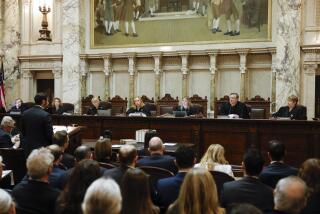Lessons from the Wisconsin recall vote
- Share via
Here are what the results of Tuesday night’s Wisconsin recall election mean for four key political players.
Gov. Scott Walker already had become a national hero to conservatives for his willingness to take on his state’s powerful public employee unions. His victory – making him the only governor in U.S. history to survive a recall – will increase his stature even further. Two other governors had faced recalls and lost, including California’s Gray Davis in 2003. Walker carried 60 of Wisconsin’s 72 counties and expanded the vote he received when first elected in 2010. Already, speculation has started about a place for Walker on a future Republican presidential ticket.
Labor unions, by contrast, suffered a serious blow to their already-waning political clout. The recall made the third election in the space of a year in which labor failed to defeat Walker or a Walker proxy. The unions lost a fight to oust a Republican state Supreme Court justice and fell short of recalling enough GOP state senators last summer to put Democrats in control of the chamber. And now this.
President Obama took considerable heat from Wisconsin Democrats for not venturing into the state to campaign against Walker, as former President Clinton did. If Walker had won by only 1 or 2 percentage points over Democratic candidate Tom Barrett, many fingers would be pointing in Obama’s direction. But with Walker winning by 7 percentage points, the argument that Obama would have made a difference becomes a lot harder to make.
The bigger question for Obama is whether Walker’s victory means that Wisconsin – a state Democrats have been counting in their column – is seriously in doubt in the fall. That brings us to Obama’s opponent.
Overall turnout in the state was roughly 2.5 million voters – a significant increase from 2010, when Walker was first elected, although still short of the number in a presidential election. Barrett actually won more votes Tuesday night than he had in 2010 in the two biggest Democratic counties, Milwaukee and Dane (Madison). The problem for the Democrat was that Walker swamped him almost everywhere else in the state. That’s more evidence for Democrats that they have yet to solve the problem which hurt them so badly in 2010 – a Republican shift among white, working class and middle class voters outside the major cities.
Mitt Romney and his advisors have a decision to make: Is Wisconsin a state to seriously contest? Wisconsin Republicans will argue that the recall proved that their voter-turnout operation works splendidly and that a consistent, tough conservative can win this quintessential purple state. But many Republican strategists still wonder whether “consistent, tough conservative” really fits as a label for Romney.
One problem for Romney is that Walker won in part because he, and groups supporting him, outspent Barrett and his allies by at least 3 to 1. Romney is not likely to have that luxury.
Moreover, polls consistently have shown that a small but significant number of ticket-splitting Walker-Obama voters exist in the state. Partisans on both sides have trouble imagining who those voters are, but one trait they seem to share is a belief that the economy will be better next year than it was this year. That optimism seems to incline some relatively nonpartisan voters to support both incumbents.
It’s not for nothing that Obama and Walker use almost identical slogans – “Forward.” Both are arguing to voters that a return to the “policies of the past” would only make matters worse. The fact that the policies they advocate differ dramatically doesn’t seem to bother the independents who appear to be the swing voters in this swing state.
More to Read
Get the L.A. Times Politics newsletter
Deeply reported insights into legislation, politics and policy from Sacramento, Washington and beyond. In your inbox twice per week.
You may occasionally receive promotional content from the Los Angeles Times.











